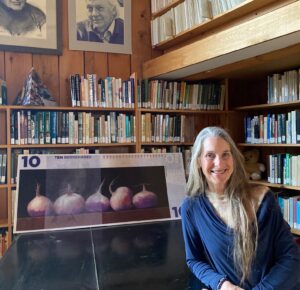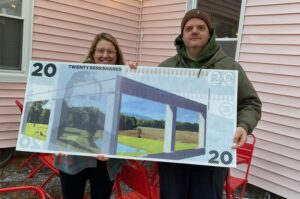Bridghe McCracken says her life’s purpose is “to create habitat in the region and to seed and grow native plants that will ensure a resilient ecosystem for generations to come.” The Helia Native Nursery founder and owner grew up in the Berkshires and was inspired by the natural world from a young age. She left to pursue academic studies in biology and landscape design before moving back to the region. In 2006, Bridghe took the position of Chief Landscape Designer at Project Native, a non-profit focused on bringing native plants into public attention. When the organization decided to close in 2015, Bridghe saw an opportunity to continue the legacy of preserving and popularizing native plants through a new mission-driven business.
Helia got its start at the former Project Native site on North Plain Road in Great Barrington before finding its permanent home at Sky Meadow Farm on East Road on the Alford/West Stockbridge border. Here, Bridghe and her team are restoring a 109-acre site to grow native perennials, trees, and shrubs, and preserve native genotypes through seed banking in a low-tech and ecologically responsible manner. In addition to being a retail nursery, the site is also home base for sister consultation business Helia Land Design.
Why are natives important? Native plants play a significant role in the habitats of local pollinators and as a result, the food chain. Bridghe shares that 90% of native insects feed exclusively on native plants, 100% of birds feed on those insects at a point during their life cycle, and so on. There’s a good chance the landscaping around your house might already contain natives. Common natives found in a garden include flowers like beardtongue, black-eyed susans, and bee balm; trees like oaks, maples, and hemlocks; shrubs like witch hazel, dogwood, and elderberries; and understory growth like ferns. Bridghe says a great landscaping goal is having 70% native species, which is the sweet spot for ensuring healthy native habitats.
But not all native plants are created equal. While there are plants that are native to North America and even the Northeast that grow well here, Helia focuses on preserving unique genotypes in the Berkshire-Taconic region that have coevolved with our native pollinator populations. This is done through the active management of Helia’s seed bank where plants are adapting to real-time temperature and moisture conditions and subsequently evolving in situ. This ensures that the genes of each plant are individually adapted to the local environment and therefore more resilient to global climate change, as distinct from genetically-identical plants found in traditional nurseries. The seeds produced are collected and sold as discrete mixtures for gardens, meadows, or lawns.
There’s never been a more important time to learn about native species and the adaptability of landscapes given the rapid changes to our climate. As part of its mission, Helia hosts workshops to educate on the importance of identifying invasive plants, utilizing medicinal plants, and of course designing native landscapes. Additional classes include yoga, meditation, and creating flower mandalas.
Both defined by a geographic region, native plants and local currencies can serve as tools for creating networks of support, communication, and mutualism. Bridghe appreciates how BerkShares add an element of transparency and accountability to our economy and align with her goal to inspire consumers to think of themselves as stewards of diverse resilient ecosystems – of both our natural and built environment.





